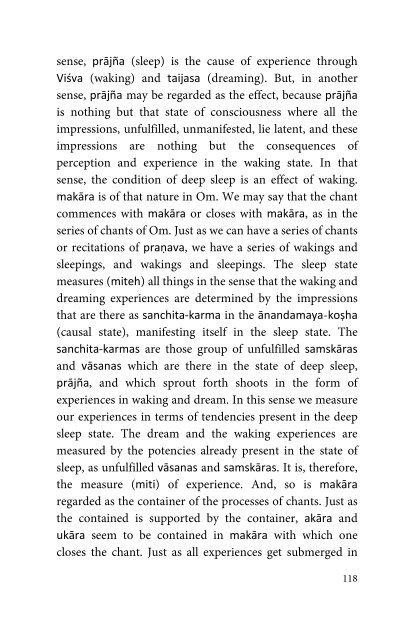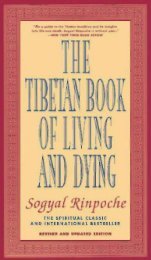sense, prājña (sleep) is the cause of experience throughViśva (waking) and taijasa (dreaming). But, in anothersense, prājña may be regarded as the effect, because prājñais nothing but that state of consciousness where all theimpressions, unfulfilled, unmanifested, lie latent, and theseimpressions are nothing but the consequences ofperception and experience in the waking state. In thatsense, the condition of deep sleep is an effect of waking.makāra is of that nature in Om. We may say that the chantcommences with makāra or closes with makāra, as in theseries of chants of Om. Just as we can have a series of chantsor recitations of praṇava, we have a series of wakings andsleepings, and wakings and sleepings. The sleep statemeasures (miteh) all things in the sense that the waking anddreaming experiences are determined by the impressionsthat are there as sanchita-karma in the ānandamaya-koṣha(causal state), manifesting itself in the sleep state. Thesanchita-karmas are those group of unfulfilled samskārasand vāsanas which are there in the state of deep sleep,prājña, and which sprout forth shoots in the form ofexperiences in waking and dream. In this sense we measureour experiences in terms of tendencies present in the deepsleep state. The dream and the waking experiences aremeasured by the potencies already present in the state ofsleep, as unfulfilled vāsanas and samskāras. It is, therefore,the measure (miti) of experience. And, so is makāraregarded as the container of the processes of chants. Just asthe contained is supported by the container, akāra andukāra seem to be contained in makāra with which onecloses the chant. Just as all experiences get submerged in118
the deep sleep state, even as all our efforts cease when we goto sleep, the recitation of Praṇava ceases when makāracommences. ‘A’ and ‘U’, merge themselves in ‘M’. Minotiha vā idam sarvam: One, who meditates thus, has thecapacity to measure all things, that is, to know everything –he becomes sarvajña. He becomes Īsvara Himself. Hebecomes the measure of all things; he becomes the yardstickfor the cognition of everything in creation. Everything isreferred to him; he does not refer himself to other things.He becomes the reference for the whole of creation, thecentre of all experience in the cosmos. Apītisca bhavati:Everything merges in him; as the verse in the secondchapter of the Bhagavad-Gītā says, everything enters intohim, as rivers enter the ocean. Īsvara is the Merger of allcreation, and when you become Īsvara, the whole creationmerges in you. You realise this state by this meditation onthe unity of makāra and prājña, the causal state of Praṇavaand the causal state of Consciousness, both individually andcosmically.Now, as there are three relative conditions of theĀtman: jāgrat, svapna and suṣhupti – waking, dream anddeep sleep – akāra, ukāra, and makāra of Praṇava, orOmkāra, may be regarded as its relative conditions. But,just as there is a transcendent state of the Ātman which hasbeen described as: nāntah-prājñam, na bahih prājñam, no-’bhayatah-prājñam, etc., there is a transcendent conditionof Praṇava, or Omkāra, which is not constituted of mātrāsor syllables, but is amātra, without any measure or syllable.Even as we cannot designate the Ātman as either this orthat, so we cannot specify this amātra condition of Om as119
- Page 1 and 2:
THE MĀNDŪKYAUPANISHADSWAMI KRISHN
- Page 3 and 4:
CONTENTSPublishers’ Preface ...
- Page 5 and 6:
INTRODUCTIONThe theme of the Manduk
- Page 7 and 8:
ceases to agitate the mind any more
- Page 9 and 10:
INVOCATION AND VERSESOm! Bhadram ka
- Page 11 and 12:
svapna-sthāno’ntaḥ-prajñaḥ
- Page 13 and 14:
8. This identical Ātman, or Self,
- Page 15 and 16:
THE PRANAVA OR OMKARAThe Vedas, in
- Page 17 and 18:
and rūpa, name as well as form. It
- Page 19 and 20:
Now, we come from what we call Īsv
- Page 21 and 22:
and to achieve this by a direct met
- Page 23 and 24:
structure and the glory of Om. With
- Page 25 and 26:
desire persisting, it would only po
- Page 27 and 28:
magnificence of Om, but how are we
- Page 29 and 30:
experience a thrill, as if an elect
- Page 31 and 32:
THE INDIVIDUAL AND THE ABSOLUTEThe
- Page 33 and 34:
vai tat. The reconciliation of “t
- Page 35 and 36:
yaccānyat trikālātitam tadapyomk
- Page 37 and 38:
The ultimate longing of all aspirin
- Page 39 and 40:
to the realisation of asti-bhāti-p
- Page 41 and 42:
structural difference is an effect
- Page 43 and 44:
self is the false self, not the rea
- Page 45 and 46:
cow, with four feet? The four feet
- Page 47 and 48:
Consciousness. A study of conscious
- Page 49 and 50:
THE UNIVERSAL VAIŚVĀNARAThis Ātm
- Page 51 and 52:
these dealings are with ‘other’
- Page 53 and 54:
the Virāt, or the Universal Person
- Page 55 and 56:
logical discrimination. This is the
- Page 57 and 58:
it were. This is the function of th
- Page 59 and 60:
world’s existence, not merely a p
- Page 61 and 62:
subtle body is not visible to us, a
- Page 63 and 64:
Now, we consider the meaning of bah
- Page 65 and 66:
ecause the consciousness of the jī
- Page 67 and 68: cannot have power over things. We a
- Page 69 and 70: we have about the dream world in re
- Page 71 and 72: is a complicated case for investiga
- Page 73 and 74: never pass such a judgment. You are
- Page 75 and 76: are in a particular state, that sta
- Page 77 and 78: But, if you feel that by waking up
- Page 79 and 80: The dream consciousness which is ta
- Page 81 and 82: ecause freewill is only as much rea
- Page 83 and 84: Dreams, therefore, are due to repre
- Page 85 and 86: egarded as pravivikta, sūkṣhma,
- Page 87 and 88: The third foot of the Ātman the th
- Page 89 and 90: ānanda, swallow ānanda, consume
- Page 91 and 92: Causal Condition, known as Īsvara.
- Page 93 and 94: ocean is being described here, the
- Page 95 and 96: of an effect, namely, the plant, an
- Page 97 and 98: Īsvara’s Being. For Him, it is a
- Page 99 and 100: or Destroyer, more than a cause of
- Page 101 and 102: which you have seen, heard, etc.? B
- Page 103 and 104: where existence becomes identical w
- Page 105 and 106: simply are. You have become That, a
- Page 107 and 108: peaceful. But the peace of the Ātm
- Page 109 and 110: seen the Ātman? Can you get the Ā
- Page 111 and 112: THE ĀTMAN AS THE PRANAVAThe Ātman
- Page 113 and 114: the Ātman in the waking state is c
- Page 115 and 116: symbolic, as the comparison of Brah
- Page 117: Therefore, your generation, your po
- Page 121 and 122: elationless. Samviśatyatmanātmān



